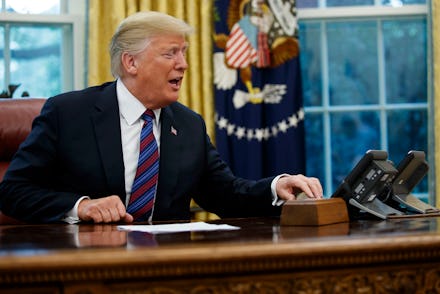Mandatory presidential text alerts violate freedom of speech, according to a new lawsuit

All Americans with a cell phone will receive a test “presidential alert” on their phones Wednesday, but a new lawsuit is fighting back against the mandatory messages.
Three individuals filed a lawsuit in the United States District Court in New York City Sept. 26 against President Donald Trump and Federal Emergency Management Agency administrator William B. Long, arguing that the presidential alert messaging system violates the First and Fourth Amendments of the U.S. Constitution. The presidential alerts — which, unlike Amber alert or other emergency messages, phone users cannot opt-out of — is a “national public warning system” that allows the president to issue messages in the case of a national emergency.
The first test of the messages will take place Wednesday at approximately 2:18 p.m. Eastern time, after an initial test on Sept. 20 was rescheduled due to Hurricane Florence.
The plaintiffs, who note they are “American citizens who do not wish to receive text messages, or messages of any kind, on any topic or subject, from Defendant Trump,” argue that the alerts turn cell phones into “Government loudspeakers” that violate the “substantive First Amendment right to be free of Government-compelled listening.” The messages also allow the government to “trespass into and hijack” cellular devices without explicit consent, which the plaintiffs argue violates the “Fourth Amendment right to privacy in their cellular devices.”
“The compulsory presidential alert system allows government speakers to trespass wholesale into Americans’ cellular devices and homes, without a warrant or consent, effectively planting a government-control loudspeaker in the ear and residence of every person with a cellular device,” plaintiffs J.B. Nicholas, Kristine Rakowsky and Liane Nikitovich claim in the lawsuit.
“Just as a pamphleteer cannot compel a passerby to accept a screed, so, too, government cannot send messages to peoples’ cellular devices without being invited to do so,” the plaintiffs added.
While the alert system is ostensibly solely meant to issue notifications on “natural disasters, acts of terrorism, and other man-made disasters or threats to public safety,” the lawsuit notes the guidelines are “unconstitutionally vague,” as it does not provide specific definitions for “acts of terrorism” or “threat to public safety.” The lawsuit notes that vagueness allows government officials, including Trump, to define the terms “as they see fit,” which could mean “potentially broadcasting arbitrary, biased, irrational and/or content-based messages to hundreds of millions of people.”
“The president could theoretically use [the alerts] for any other type of alert as decided by the president,” the lawsuit quotes John Lawson, the executive director of the Advanced Warning and Response Network, as saying. Lawson, who advised FEMA on its emergency alert system, noted that abuse of the messages is “possible.”
While plaintiffs had reportedly hoped to receive a preliminary injunction halting Wednesday’s test of the presidential alerts, the test is still slated to move forward as planned. No hearings had yet been scheduled in the case as of Monday, according to Politico.